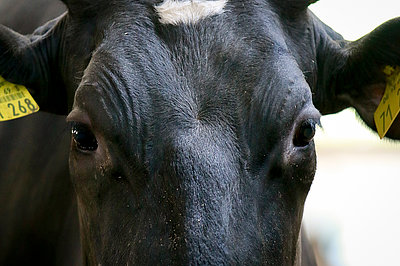One Health
Agriculture as an integral part of sustainable health management
One Health is a cooperative, multisectoral and transdisciplinary approach that recognises that the health of people, animals, plants and their shared environment are inextricably linked. The aim is to improve human, animal and environmental health and well-being at local, regional, national and global level.
In view of current environment and development problems, only an integrated approach can ensure sustainable health management. Integrative components of One Health are human and animal health, the environment, food safety and food security and agriculture.
Reconsidering the role of agriculture
A growing world population and efforts to protect the climate are leading to an enormous increase in the qualitative and quantitative expectations regarding agricultural products and production: There is growing demand for high-quality food of both animal and plant origin. Bio-economic systems that rely on bio-based materials and energy are increasingly developing. Also, agriculture is responsible for a number of essential ecosystem services.
However, the resulting intensification of production in its current form leads to a number of environmental damages and consequently to considerable health costs, which are largely due to open substance cycles, especially with regard to nitrogen.
Our research is based on the assumption that agriculture is conducted in harmony with nature. We develop innovative technologies and management strategies and apply them to use nature's potential and mechanisms efficiently and sustainably. Recent advances in technology, robotics, sensor development, digitization, and data sciences have opened up completely new options for sustainable land management that is oriented towards the mechanisms of nature and will be highly efficient and productive.
With our research in the framework of the One Health approach, we are expanding the existing agricultural sector's tasks - the production of biomass - by including the perspective of preventive health care. This means that we are anchoring agriculture as an integral part of a comprehensive One Health concept.
Animal husbandry as a component of circular agricultural systems
FAO publications document the importance of agriculture and food in achieving the 17 UN goals for sustainable development. They also describe the special role of animal husbandry as an indispensable component of circular-oriented and sustainable agricultural systems. However, animal husbandry also faces a number of problems. Most prominent are the emission of nitrogen compounds and greenhouse gases, the spread of antibiotic-resistant germs and the interaction between animal welfare and environmental protection.
In inter- and transdisciplinary research projects we address emissions, animal welfare and veterinary issues - from the basis to the application. These initiatives are closely linked to international activities through our leadership in international bodies and involvement in FAO, IPCC and EU Commission initiatives.
The focus of our research is on livestock-environment interaction. We measure, model and test reduction potentials of emissions, especially NH3, CH4, N2O, bioaerosols and particulate matter. For this purpose we work with on-farm measurements, use mechanistic modelling with CFD simulations and reaction kinetic models, the biophysical characterisation of aerosols and the numerical modelling of their transmission processes.
We record animal-specific adaptation reactions such as performance, vitality, disease and behaviour by using various sensors. For example, a sensor developed at ATB is used to measure respiratory rate.
We analyse the recorded data using modern methods of data science. Digital methods are already successfully applied in dairy farming. Sensor technology solutions are developed and integrated into digital processes in order to control and optimise housing environments as well as production processes in terms of a transparent, animal-friendly, environmentally friendly and economic production, while taking individual data of each animal into account.
Selected research projects on the topic
-
The diversification of crop production systems in combination with a reduction in the use of agrochemicals and an increase in landscape complexity has the potential to promote biodiversity at the field and landscape scal…
-
The objective of the project LIFE CARBON FARMING is to reduce by 15% the carbon footprint of mixed crop livestock farms thanks to a result-based system. The project will mutualize knowledge of 30 partners to build a comm…
-
The aim of the project is the individualised and breeding-based prevention of heat stress in dairy cows with the help of the development of an early warning system and a health monitoring system that alerts the farmer in…
-
The AMR-PIG project is investigating mechanisms and transmission pathways that lead to the spread of AMR antimicrobial resistance in animal husbandry in particular in pig fattening. Feeding trials and hygiene improvement…
-
In the EmiMod joint project, methods for determining emissions from diffuse area sources (e.g. freely ventilated pig and cattle stalls with runs/running yards and other external emission sources such as slurry tanks) are…
Search for more projects ...
Selected publications on the topic
- Hempel, S.; Janke, D.; Losand, B.; Zeyer, K.; Zähner, M.; Mohn, J.; Amon, T.; Schrade, S. (2022): Comparison of methane emission patterns from dairy housings with solid and slatted floors at two locations. Agronomy. (2): p. 381. Online: https://doi.org/10.3390/agronomy12020381
- Thomas, C.; Idler, C.; Ammon, C.; Amon, T. (2020): Effects of the C/N ratio and moisture content on the survival of ESBL-producing Escherichia coli during chicken manure composting. Waste Management. (February): p. 110-118. Online: https://doi.org/10.1016/j.wasman.2020.01.031
- Kabelitz, T.; Biniasch, O.; Ammon, C.; Nübel, U.; Thiel, N.; Janke, D.; Senthilathiban, S.; Funk, R.; Münch, S.; Rösler, U.; Stiller, P.; Amon, B.; Aarnink, A.; Amon, T. (2021): Particulate matter emissions during field application of poultry manure - The influence of moisture content and treatment. Science of the Total Environment. (1. August 2021): p. 146652. Online: https://doi.org/10.1016/j.scitotenv.2021.146652
- Skiba, U.; Medinets, S.; Cardenas, L.; Hutchings, N.; Amon, B. (2021): Assessing the contribution of soil NOx emissions to European atmospheric pollution. Environmental Research Letters. (16): p. 25009. Online: https://doi.org/10.1088/1748-9326/abd2f2
- Hempel, S.; Menz, C.; Pinto, S.; Galan, E.; Janke, D.; Estelles, F.; Müschner-Siemens, T.; Wang, X.; Heinicke, J.; Zhang, G.; Amon, B.; del Prado, A.; Amon, T. (2019): Heat stress risk in European dairy cattle husbandry under different climate change scenarios - uncertainties and potential impacts. Earth System Dynamics. (4): p. 859-884. Online: https://doi.org/10.5194/esd-10-859-2019
Search for more publications on the topic ...



